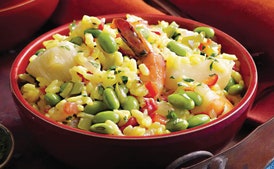
Introduction
Paella is a traditional Spanish dish that brings people together around the dinner table. Our Seafood Paella with Edamame reimagines this classic by adding nutritious edamame to create an innovative yet authentic flavor profile. This recipe offers a delightful blend of seafood and vegetables, showcasing how traditional Spanish cooking can be adapted for modern tastes without losing its essence.
Tips for this Recipe
– Ensure your paella pan is preheated to guarantee even heat distribution throughout the dish.
– Use quality ingredients, especially when it comes to seafood; freshness makes all the difference.
– While edamame isn’t traditional in Spanish cuisine, its addition here provides a unique twist on paella that complements the seafood well.
– Consider using sustainable seafood sources to align with eco-friendly cooking practices.
Why you will love this recipe
This Seafood Paella with Edamame stands out by offering a fusion of classic flavors and a fresh, healthy ingredient that adds vibrancy to the dish without overpowering it. Whether you’re looking for an innovative dinner option or simply enjoy exploring new culinary experiences, this recipe promises satisfaction with every bite.
Ingredients
2 cups low-sodium chicken broth
1/2 teaspoon saffron threads
1 tablespoon olive oil
1 cup chopped onion
2/3 cup diced red bell pepper
2/3 cup diced green bell pepper
1/2 cup canned diced tomatoes, drained
1 tablespoon chopped garlic
1 tablespoon chopped fresh thyme or 1 teaspoon dried
1 teaspoon salt
1/2 teaspoon freshly ground black pepper
1 cup short-grain rice (such as arborio)
1 cup frozen shelled edamame, thawed
1/2 pound large shrimp, shelled and deveined
1/2 pound sea scallops, halved if large
2 tablespoons chopped fresh cilantro
Adviced equipments
– Paella Pan: For the authentic cooking experience.
– Dutch Oven: Useful for slow-cooking rice dishes and providing even heat distribution.
– Stainless Steel Skillet: Perfect for browning meats or vegetables before adding them to the paella.
– Wooden Spoon: To stir the rice without scratching non-stick surfaces.
– Measuring Cups: Essential for accurate ingredient measurement, especially for broth and portions of seafood.
– Heavy-Duty Mixing Bowl: For combining all paella ingredients before cooking.
– Kitchen Scale: Useful for precise measurements in the recipe preparation.
– Food Processor: Handy for chopping vegetables, such as peas or onions.
– Instant-Read Thermometer (optional): While not traditional, it can be used to check meat doneness or liquid temperatures.
– Stirring Spoon: A sturdy spoon suitable for stirring and mixing ingredients during preparation.
History of the recipe
Paella has its roots in Valencia, Spain, where it was traditionally cooked by farmers using leftover rice from previous meals to feed their families on Sundays after church services. Over time, it evolved into a dish that represents Spanish culture and cuisine as we know it today. The incorporation of seafood paella, or “arròs amb mar i xocolata,” is also prevalent in Valencia’s coastal communities, where the abundance of fresh catches made its inclusion a natural progression for many variations of this dish.
Fun facts about this recipe
– Did you know that edamame was first introduced to Spanish cuisine in recent years? Its addition is an example of modern culinary experimentation while maintaining the core essence of paella.
– Seafood paella variations can differ significantly from region to region within Spain, each showcasing local seafood preferences and cooking techniques passed down through generations.
– Innovative recipes like our Seafood Paella with Edamame highlight how traditional dishes can be revitalized by incorporating new elements without losing their cultural significance or authenticity.



